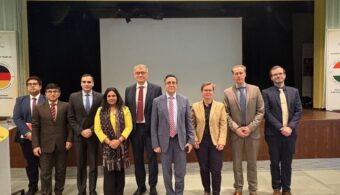At a roundtable in New Delhi on Monday, September 22, Indian and German leaders called for a decisive scale-up of research and development (R&D) to strengthen technology transfer, renewable energy manufacturing, and workforce skilling between the two nations. The session, organised by the Confederation of Indian Industry (CII), highlighted opportunities for India and Germany to accelerate cooperation in solar, wind, storage, and digital innovation.
India’s R&D Deficit Underlined
Praveer Sinha, Managing Director of Tata Power and Chairman of CII’s National Committee on Power, said Indian companies must raise their commitment to basic R&D. He pointed out that most industries allocate only 3–5% of budgets to research, leaving a gap in laboratories, infrastructure, and skilled talent.
“We need to create a more robust R&D ecosystem in Indian industry,” Sinha said, stressing that both government and private players must act instead of deferring responsibility. His remarks were also cited in a report by Economic Times.
German Envoy: Break Barriers in Technology Transfer
Germany’s Ambassador to India, Dr. Philipp Ackermann, stressed that Indo-German cooperation should focus on disruptive ways to share technology. He noted that advanced German machinery and renewable technologies could help India scale its clean energy ambitions, provided both sides invest in deeper R&D ties.
“Investments in R&D cannot be ignored. Collaboration on energy is critical, and the ongoing EU–India free trade agreement could open new frameworks for data, mobility, and joint industrial projects,” Ambassador Ackermann observed. He also stressed the need for a globally mobile, skilled workforce that can work in both countries and transfer know-how effectively.
Solar Lessons and Opportunities
Ambassador Ackermann pointed to Germany’s solar industry, which declined under pressure from lower-cost Chinese imports. He said Berlin now sees India as a crucial partner for solar panel manufacturing.
“In Germany, production is simply too expensive, but India is well-positioned to take the lead,” he said, adding that Germany would support India in developing a competitive solar manufacturing base.
Industry, Policy, and Financing on the Table
The CII discussion, “India-Germany Energy Partnership: Make in India Solar, Wind, Storage & Skills for a Global Clean Energy Market”, featured leaders such as Minister of State for Power and Renewable Energy Shripad Yesso Naik, Siemens Energy India CEO Guilherme Vieira De Mendonca, and EDAG India Director Bipin Chandra.
Discussions centred on:
- Expanding renewable manufacturing under “Make in India.”
- Aligning Indian and German policy frameworks for clean energy.
- Financing models for solar, wind, and storage deployment.
- Skilling and training programs to prepare a globally mobile workforce.
The session concluded with calls to translate dialogue into action through scalable investments, diversified supply chains, and stronger Indo-German manufacturing alliances.
Indo-German R&D Landscape
India and Germany have collaborated on science and technology for over five decades, beginning with the 1971 Indo-German S&T Cooperation Agreement. Today, Germany is one of India’s largest European research partners, with more than 1,000 joint projects in fields such as renewable energy, green hydrogen, advanced manufacturing, semiconductors, and health technologies.
Institutions like the Indo-German Science & Technology Centre (IGSTC), Fraunhofer-Gesellschaft, and Max Planck Society work closely with Indian research organisations and universities. Both nations are now focusing on semiconductor design, hydrogen economy models, and digitalisation of manufacturing as future pillars of cooperation.
The partnership is seen as a strategic lever to help India build competitive supply chains, meet its clean energy targets, and position both economies at the forefront of global technology innovation.



